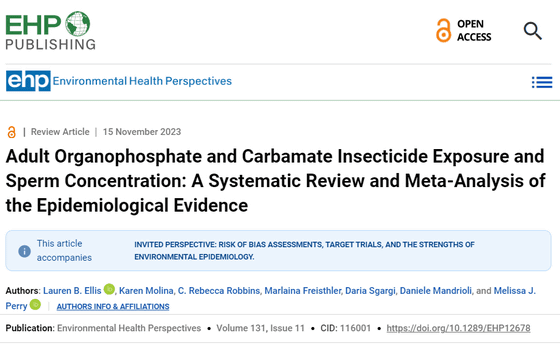Research results show that pesticide ingredients contained in pesticides were a factor in reducing sperm count in men

A review of research over the past 50 years shows that pesticide ingredients in pesticides are contributing to dramatic declines in sperm counts in men around the world, says George Washington. Published by a university research team.
Adult Organophosphate and Carbamate Insecticide Exposure and Sperm Concentration: A Systematic Review and Meta-Analysis of the Epidemiological Evidence | Environmental Health Perspectives | Vol. 131, No. 11
https://ehp.niehs.nih.gov/doi/10.1289/EHP12678

Common pesticides in food reducing sperm count worldwide, study says | CNN
https://edition.cnn.com/2023/11/15/health/sperm-damage-pesticides-wellness/index.html

The paper, published in the academic journal Environment Health Perspectives, examined 25 studies on two substances, organophosphates and N-methylcarbamates, which are also used as insecticides and pesticides. It has been. The research team then examined 42 different levels of influence in 1,774 men from 21 different study populations.

According to the research team, the ``sperm count'' contained in the entire ejaculated semen is generally emphasized as a barometer for measuring future fertility, but since the amount of semen differs from person to person, The comparison was made using ``sperm concentration,'' which is the amount of sperm. The results showed that men with high exposure to pesticides, such as agricultural workers, had significantly lower sperm concentrations than men with low exposure to organophosphates and N-methylcarbamates. It turns out.
Previous research has shown that organophosphates and N-methylcarbamates directly interfere with sex hormones, damage cells in the testes, and alter neurotransmitters in the brain, affecting sperm production. It is said that it has been done.
'Sperm is a very sensitive end point when it comes to a man's overall health,' said study lead author Melissa Perry, a professor at George Mason University's School of Public Health. 'My best advice is to be aware of pesticides around you. 'Unnecessary exposure to pesticides should be avoided, especially if you plan to have children in the future.'

CNN, an American news media, claims, ``The simplest measure is to avoid foods that use pesticides, including these pesticides, and choose organic foods whenever possible.'' The U.S. Food and Drug Administration offers the following advice on cleaning produce:
-Wash your hands with warm water and soap for 20 seconds before and after preparing fresh food.
Rinse vegetables and fruits with water before peeling to avoid transferring dirt and bacteria from the knife to the fruit or vegetable.
・For hard produce such as apples and melons, use a clean brush to scrub them.
・After washing, wipe with a clean cloth or paper towel to remove moisture.

Related Posts:
in Science, Posted by log1i_yk







